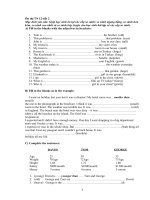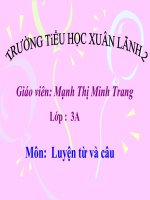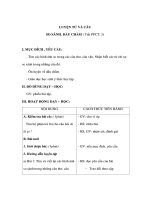Cau hoi duoi cau so sanh Gerunds
Bạn đang xem bản rút gọn của tài liệu. Xem và tải ngay bản đầy đủ của tài liệu tại đây (70.94 KB, 9 trang )
<span class='text_page_counter'>(1)</span><div class='page_container' data-page=1>
<b>NGỮ PHÁP LỚP 12 </b>
<b>CÂU HỎI ĐUÔI</b>
<b>A. Câu hỏi đuôi được thành lập theo những quy luật sau đây: </b>
1. Nếu câu đứng trước ở thể xác định, thì câu hỏi đi ở thể phủ định và ngược lại.
Ex: He is a lazy boy, <b>isn’t he ? </b>She is not beautiful, <b>is she? </b>
2. Nếu động từ của câu đứng trước là động từ đặc biệt can, shall, will, be, have, ought to, … ta phải lặp lại động từ
đó trong câu hỏi đi. Nếu là động từ thường, ta phải dùng DO, DOES, DID thay trong câu hỏi đuôi.
EX: They cannot sing, <b>can’t they? </b> She likes me, <b>doesn’t she? </b>He came here yesterday, <b>didn’t he? </b>
- Hình thức phủ định trong câu hỏi đuôi phải ở thể tỉnh lược.
- Phải dùng đại từ nhân xưng trong câu hỏi đuôi.(I, you, we, they, he, she, It)
<b>B. Những ghi chú đặc biệt về câu hỏi đuôi: </b>
<b>1. MODAL PERFECT: Câu hỏi đuôi dùng như những trợ động từ bình thường. </b>
Ex: You could have seen him, <b>couldn’t you? </b>He might have bought the book, <b>mightn’t he? </b>
He should have told me, <b>shouldn’t he? </b>
<b>2. HAD BETTER: “NÊN … THÌ HƠN”: </b>
Ex: We had better work harder, <b>hadn’t we? </b>We had better not go out late at night, <b>had we? </b>
<b>3. USED TO: “ĐÃ TỪNG …, ĐÃ THƯỜNG…” </b>xem như động từ thường hoặc động từ đặc biệt đều được.
Ex: You used to go there, <b>usedn’t you? = </b>You used to go there, <b>didn’t you? </b>
<b>4. LET’S … : “CHÚNG TA HÃY…” </b>
Ex: Let’s do it right now, <b>shall we? </b>
<b>5. There is …………, isn’t there?</b>
<b>There are …………., aren’t there? </b>
<b>This/ That is …………, isn’t it? </b>
<b>These / Those are …………., aren’t they? </b>
<b>I am ………, aren’t I?/ am I not? </b>
<b>6. Câu mệnh leänh: </b>
Ex: Come and see me now, <b>will you? </b>Don’t be lazy, <b>will you? </b>
<b>7. Các từ phủ định: never, nowhere, nothing, by no means, fail …</b>
Ex: You have <b>never</b> seen it, <b>have you? </b>He is <b>by no means</b> rich, <b>is he</b>? She <b>failed </b>to phone her office, <b>did she?</b>
<b>8. Những từ có nghĩa bán phủ định: hardly,scarcely(</b>một cách khó khăn, chắc chắn là khơng<b>), ever, seldom, </b>
<b>rarely … </b>
Ex: You <b>seldom</b> see her, <b>do you? </b>You <b>hardly ever</b> go to the theatre, <b>do you? </b>
He can <b>scarcely </b> write his own name, <b>can he? </b>He could <b>hardly </b>stammer (laép baép) a reply, <b>could he? </b>
<b>9. LITTLE, A LITTLE, FEW, A FEW : </b>
Ex: He has very <b>little</b> knowledge of the matter, <b>has he</b>?
He has very <b>alittle</b> knowledge of the matter, <b>hasn’t he</b>?
Very <b>few</b> people live to the age of one hundred, <b>do they</b>?
You are going away for <b>a few</b> days, <b>aren’t you</b>?
<b>10. EVERYBODY= EVERYONE / EVERYTHING: </b>
Ex: <b>Everyone/ Everybody</b> knew that, <b>didn’t they</b>? <b>Everyone</b> is ready for the party, <b>aren’t they</b>?
<b>Everything</b> is good, <b>isn’t it?</b>
<i><b>* Complete the question tag:</b></i>
1. Linh didn’t feel confident in her favorite clothes, _______________?
2. The two cities are not the same in some ways, _______________?
3. Her listening isn’t excellent, _______________?
4. Maryam couldn’t stay for longer time, _______________?
5. My sister has to make this room tidy, _______________?
6. This poet has mentioned the ao dai in poems, _______________?
7. Lan used to walk past the mosque on her way to primary school, _________?
8. Nobody wrote poems yesterday, _______________?
9. There are many religions in Malasia, _______________?
10. His children may swim, _______________?
11. Nam and Binh have to study harder, _______________?
</div>
<span class='text_page_counter'>(2)</span><div class='page_container' data-page=2>
13. The Parkers had a picnic on the river bank, _______________?
14. Our teachers have taken inspiration from some minorities, ______________?
15. Everything was OK, _______________?
16. Oh, hurry up, _______________?
17. Hung and I can eat those cakes, _______________?
18. You won’t be late, _______________?
19. Ba’s village lies near the foot of the moutain, _______________?
20. Daisy has seen that films several times, _______________?
21. Let’s forget unhappy things, _______________?
22. Her daughter doesn’t spend time surfing the web, _______________?
23. Those men never worked on a farm, _______________?
24. People of different ages like this magazine, _______________?
25. I am wearing wrong shoes, _______________?
26. Interactive TV is available now, _______________?
27. He did not miss the train, _______________?
28. Someone feels tired after the trip, _______________?
29. Hanh and you like living in a dormitory on campus, _______________?
30. Their son doesn’t have much time on computer, _______________?
<b>CAÂU SO SAÙNH</b>
A. SO SÁNH HƠN: (DÙNG ĐỂ SO SÁNH 2 NGƯỜI 2 VẬT).
1. TÍNH TỪ NGẮN & TRẠNG TỪ NGẮN:
* Cơng thức:
* Tính từ ngắn:
S1 + BE + ADJ ngắn + ER + THAN + S2.
EX: He is taller than me.
They are smaller than my shoes.
* Trạng từ ngắn:
S1 + V + ADV ngắn + ER + THAN + S2.
EX: He works harder than his brother.
A horse runs faster than a dog.
* MỘT SỐ NGOẠI LỆ KHI THÊM “ER” VÀO SAU TÍNH VÀ TRẠNG TỪ NGẮN:
<b>ADJ/ ADV NGẮN</b>
<b>SO SÁNH HƠN</b>
<b>SO SÁNH NHẤT</b>
Good/ well
better
the best
Bad/ badly
worse
the worst
Much/ many
more
the most
Little
less
the least
old
older/ elder
the oldest/ the eldest
far
farther / further
the farthest/ the furthest
* NHỮNG TÍNH TỪ HAI VẦN TẬN CÙNG BẰNG: Y, ER, OW, LE : XEM NHƯ TÍNH TỪ NGẮN.
EX: happy - happier ; pretty - prettier ; easy - easier
clever - cleverer
narrow - narrower
simple - simpler
2. TÍNH VÀ TRẠNG TỪ DÀI:
* Tính từ dài: S1 + BE + MORE + ADJ + THAN + S2.
* Trạng từ dài: S1 + V + MORE + ADV + THAN + S2.
B. SO SÁNH NHẤT: (DÙNG ĐỂ SO SÁNH 3 NGƯỜI 3 VẬT TRỞ LÊN).
1. TÍNH TỪ NGẮN & TRẠNG TỪ NGẮN:
* Công thức:
* Tính từ ngắn:
S + BE + + THE +ADJ ngắn + EST (N)+ cụm giới từ…
EX: He is
<b>the tallest</b>
pupil in my class.
They are
<b>the smallest</b>
shoes we have.
* Trạng từ ngắn:
S + V + THE + ADV ngắn + EST + cụm giới từ.
EX: He works the hardest in his family.
</div>
<span class='text_page_counter'>(3)</span><div class='page_container' data-page=3>
2. TÍNH VÀ TRẠNG TỪ DÀI:
* Tính từ dài: S + BE + THE MOST + ADJ +( N )+ cụm giới từ….
* Trạng từ dài: S + V + THE MOST + ADV )+ cụm giới từ….
Ex:
Spring is the most pleasant season of year.
This book is the most interesting of all.
He drives the most carefully in his group.
C. SO SÁNH BẰNG: (SO SÁNH 2 NGƯỜI, 2 VẬT)
1. TÍNH TỪ:
* Công thức: S1 + BE + AS + ADJ + AS + S2.
EX: He is
<b>as</b>
tall
<b>as</b>
his brother.
Lan is
<b>as</b>
intelligent
<b>as</b>
Mai.
2. TRẠNG TỪ:
* Công thức: S1 + V + AS + ADV + AS + S2.
EX: She
<b>cooks</b>
<b>as</b>
well
<b>as</b>
her mother.
He
<b>dances</b>
<b>as</b>
gracefully
<b>as</b>
a dancer.
<b>II. EXERCISES:</b>
<b>* Exercise 1: Choose the best answer: </b>
1. Ho Chi Minh city is much ... than Hanoi capital.
A. larger B. smaller C. higher D. lower
2. Australia is the ... continent in the world.
A. largest B. smallest C. biggest D. thinner
3. Living in the countryside is ... than in cities.
A. less peaceful B. more peaceful C. most peaceful D. least peaceful
4. Your car is in ... condition than mine.
A. worse B. worst C. bad D. good
5. That was the ... day in my life.
A. excited B. happinest C. happiest D. interesting
6. Hoa doesn’t cook ... her mother.
A. as bad as B. as good as C. as quick as D. as well as
7. She is the ... beautiful girl I have ever met.
A. less B. more C. most D. best
8. The Queen of England is one of the ... women in the world.
A. richer B. richest C. most rich D. as rich as
9. I’m sorry I’m late. It took me ... to get here than I expected.
A. longer B. further C. more D. less
10. Her illness was more ... than we first thought.
A. fatal B. important C. severe D. serious
11. Health and happiness are more ... than money.
A. importantly B. important C. importance D. serious
12. We often go camping when we go on holiday because it’s ... than staying in a hotel.
A. much cheaper B. more cheaper C. less cheaper D. the most cheapest
13. Please let me know immediately if you hear any ... news.
A. farther B. further C. extra D. earlier
14. There were ... people at this meeting than at the last one.
A. less B. much C. many D. fewer
15. That house over there is the ... building in the town.
A. eldest B. oldest C. ancientest D. antique
16. What’s the ... film you’ve ever seen?
A. good B. interesting C. best D. boring
17. What’s the ... river in the world?
A. short B. long C. wide D. longest
18. I stayed in one of the ... room in the hotel.
A. large B. nicest C. pretty D. nicer
19. Let’s walk. It’s just ... taking the bus.
</div>
<span class='text_page_counter'>(4)</span><div class='page_container' data-page=4>
20. There’s plenty of food, so eat ... you like.
A. as many as B. as much as C. as lot as D. as great as
21. The blue whale is ... known animals, reaching a length of more than one hundred feet.
A. the large B. the largest C. the larger D. the most largest
22. By far ... of Saudi Arabia is oil.
A. it is the most important export B. the most important export is
C. that is the most important export D. the most important export
23. They would ... go by air than spend a week travelling by train.
A. always B. prefer C. rather D. better
24. Mike was the ... in his family; all his brothers were much taller.
A. lowest B. shortest C. slightest D. littlest
25. North America is a little ... than South America.
A. big B. huge C. vast D. larger
26. I think Sally is quite ... her sister.
A. as pretty B. as pretty than C. as pretty as D. prettier
27. I am not sure, but ... I know he has decided to accept the new job in London.
A. according B. on the whole C. as far as D. as long as
28. We need ... information before we can decide.
A. far B. farther C. further D. the farthest
29. Tony’s English is much better than it was.
A. Tony has started to learn English but doesn’t speak it well.
B. Tony speaks better English now than he did before.
C. Tony’s English was much better than it is now.
D. Tony has always spoken good English.
30. Joe was one of the poorest men in this town.
A. There were some poor people in this town, but Joe was the poorest one.
B. One man who lived in this town was much poorer than Joe.
C. Joe thought that he was the only poor man in this town.
D. Some very poor men lived in this town, and Joe was one of them.
31. Mr Bridges is by far the richest man I know.
A. Mr Bridges is the richest man in my country.
B. Mr Bridges is one of many rich men I know.
C. Mr Bridges is richer than all his friends.
D. Mr Bridges is much richer than anyone else I know.
<b>GERUND AND INFINITIVE</b>
<b>I. FUNCTIONS OF GERUND (Chức năng của Gerund):</b>
<b>1. Subject for a verb : (Làm chủ ngữ cho động từ ) .</b>
EX: Swimming is good for your health.
Smoking is not good for your health.
2. <b>Object for some verbs (Làm tân ngữ cho một số động từ) </b>:
admit, advise, anticipate, appreciate, avoid, complete, consider, delay, deny, discuss, dislike, enjoy, finish, can’t help, can’t
bear, can’t stand, keep, mention, mind, miss, postpone, practice, quit, recall, recommend, resent, suggest, hate, love, like,
start, begin, forget, remember, stop, regret, continue, acknowledge, endure(chịu đựng, cam chịu), imagine, justify,
resist(kháng cự, chống lại), feel like, forgive, risk, tolerate.
* Công thức: S + V+ GERUND (V-ING) + O.
Ex: I like playing football. She admited stealing a bike. Nam can’t stand living alone.
<b>3. Object for preposition (Làm tân ngữ cho giới từ):</b>
tobe interested in: thích, quan tâm tobe fond of: thích tobe bored with: buồn chán
tobe fed up with: thích tobe afraid of: sợ tobe surprised at: ngạc nhiên về ..
tobe worried about: lo lắng về… tobe amused at: thích tobe amazed at: kinh ngạc về …
tobe famous for: nổi tiếng về… tobe different from: khác với… tobe good/ bad at: giỏi/ tệ về…
tobe excited at/ about: thích thú, hào hứng tobe frightened of: sợ hãy tobe keen on: thích
tobe pleased with: hài lòng với… tobe relaxed with: thư giản tobe exhausted at: mệt
tobe busy with: bận rộn với… tobe absent from: vắng mặt từ… to rely on: trơng cậy vào
tobe present at: có mặt, hiện diện tobe tired of: mệt mõi tobe terrified of: khiếp sợ, kinh hãi
tobe nervous of: hồi hộp, lo lắng tobe successful in: thành công về … to be used to: quen với
to get used to: quen với to think of/ about: suy nghĩ về… to give up: từ bỏ
to depend on: phụ thuộc vào to insit on: khăng khăng
</div>
<span class='text_page_counter'>(5)</span><div class='page_container' data-page=5>
EX: I am interested in playing football.
They are fond of watching films.
Gerund Gerund
<b>4. Object for some phrases and expressions (Làm tân ngữ cho một số cụm từ và thành ngữ)</b>:
to look forward to, It’s no use, It’s no good, It’s worth, have difficulty + gerund.
EX: I am looking forward to seeing you again.
It’s no use/ It’s no good asking him for help.
It’s worth buying that book.
I have difficulty finding a job in this city.
<b>5. Một số động từ theo sau có thể dùng Gerund or To Infinitive đều không thay đổi nghĩa: </b>
<b>begin, start, hate, prefer, continue, like, intend, attempt.</b>
<b>EX: I hate to see you = I hate seeing you.</b>
<b>6. Một số động từ theo sau dùng Gerund nghĩa khác dùng To infinitive nghĩa khác: stop , remember, forget, regret,</b>
<b>try. </b>
<b>a. Stop + to Vo: dừng việc này để làm việc khác.</b>
<b> Stop + Ving : dừng hẳn việc đang làm</b>
<b>EX: My father stopped to help me with the housework.</b>
<b>My father stopped smoking 3 years ago.</b>
<b>b. Remember + to Vo: Nhớ để làm điều gì như là một bổn phận, trách nhiệm.</b>
<b> Rember + Ving: Nhớ là đã có làm gì trong quá khứ.</b>
<b>EX: We always remember to turn off the lights before going out.</b>
<b>I remember meeting you somewhere already.</b>
<b>c. Forget + to Vo : quên không làm việc gì.</b>
<b> Forget + Ving : quên là đã có làm việc gì. đó.</b>
<b>Ex: Oh, I forgot to send your letter. I am sorry. </b>
<b>I forget lending you my dictionary yesterday.</b>
<b>d. Regret + to Vo: Lấy làm tiếc để thông báo cho ai một tin không vui,không may.</b>
<b> Regret + Ving: Hối tiếc vì đã làm gì đó trong q khứ.</b>
<b>EX: I regret to tell you that you have failed the exams.</b>
<b>I regret lending him some money. He will never pay me back.</b>
<b>e. Try + to Vo : Cố gắng làm việc gì.</b>
<b> Try + Ving: thử </b>
<b>EX: I try to study hard to pass the exams.</b>
<b>He tried eating the food I cooked. It was terrible.</b>
<b>7. Sau các động từ </b><i><b>allow, advise, forbid, permit, recommend </b></i><b>dùng được Gerund khi không có túc từ.</b>
<b>S + </b><i><b>allow, advise, forbid, permit, recommend + O + TOVo</b></i>
<b>S + </b><i><b>allow, advise, forbid, permit, recommend + VING </b></i>
EX: Sorry, we don’t allow smoking in this room.
I wouldn’t advise taking the car.
<b>II. INFINITIVE WITH TO: </b>
<b>1. Làm chủ ngữ: </b>
Eg: <b>To love</b> is to give.
<b>To find</b> my house is easy.
<b>To save</b> money now is necessary.
<b>2. Bổ ngữ của động từ:</b>
<b>Eg: </b>Our duty is <b>to study</b> harder.
<b> 3. Làm tân ngữ cho một số động từ.(Theo sau một số động từ quy định)</b>
afford, agree, appear, attempt, arrange, ask, beg, care, claim, decide, demand, expect, fail, hesitate, hope, learn, manage,
need, offer, plan, prepare, pretend, promise, refuse, seem, struggle, threaten, volunteer, wait, want, wish.
* Công thức: S + V quy định + to Vo ...
EX: I agreed to help him. He threatened to call the police.
<b>4. Verbs followed by a pro(noun) + an infinitive: </b>
advise, allow, ask, arrange, beg, cause, challenge, convince, dare, encourage, expect, forbid, force, hire, invite, need, order,
permit, persuade, remind, require, tell, urge, want, warn, teach, instruct (dạy, hướng dẫn, thông báo), get, would like, would
prefer.
* Công thức: S + V quy định + O + to Vo ...
EX: I advised me to study hard. He allowed his son to go out .
</div>
<span class='text_page_counter'>(6)</span><div class='page_container' data-page=6>
unable, afraid, amused, annoyed(làm bực mình,chọc tức), anxious, astonished(làm ngạc nhiên), certain, delighted,
determined(xác định), eager, easy, good, glad, grateful, happy, hard, fortunate(may mắn, đem lại vận may), pleased,
prepared, ready, safe, surprised, wonderful, worry...
Eg: I’m glad to see you again.
We are unable to solve the problem.
<b>6. Chỉ mục đích: </b>
<b>EX: </b>We study hard <b>to pass</b> the exam.
We go to school to widen our knowledge.
<b>III. INFINITIVE WITHOUT TO: </b>
<b>Động từ nguyên mẫu không TO được sử dụng trong các trường hợp sau:</b>
<b>1. Sau các động từ khiếm khuyết: can, may,must, will, shall, could, should, might, ought to, would...</b>
<b>Eg: </b>He <b>can</b> speak 3 languages.
<b>2. Sau các động từ chỉ giác quan như: feel, hear, see, watch, let, percieve = notice(nhận thấy), mark (để ý thấy),</b>
<b>observe (chú ý thấy), beheld (trông thấy), hard at (lắng nghe) ... </b>
<b>Eg: </b>I saw him unlock the door.
He made me study hard. (câu chủ động)
She let the ball fall onto the floor.
<b>* Feel, hear, see, watch </b>
thường được thêo sau bởi V-ING khi đề cập đến sự tiếp diễn của hành động.
Eg: I hear someone knocking at the front door.
I saw the man walking down the street.
<b>3. Sau các động từ như: had better, would rather, have to, used to. </b>
<b>Eg: </b>We would rather wait till tomorrow.
You had better put your money in the bank.
<b>4. NEED (cần) , NEEDN’T (không cần thiết)</b>
Sngười + need + toVo
S vaät + need + VING/ TO BE VED/ V3
S + NEEDN”T + Vo
EX: Mai needs to buy some salt and sugar. This car needs repairing/ to be repaired.
She needn’t walk to work, she has a bike.
5. <b>Sau các động từ như: make, help, let: </b>
<b>a. Cấu trúc với make: </b>
<b>S+ MAKE/MADE + O + Vo . (Câu chủ động)</b>
<b>S + BE + MADE + TO Vo + BY O. (Câu bị động)</b>
EX: What makes you laugh? She made me cry. I was made to study hard. She is made to be sad.
<b>b. Cấu trúc với HELP: S + HELP + O + Vo </b>
EX: Please help me carry this heavy bag.
C. Cấu trúc với LET:
S + LET + O + Vo (Chủ động)
S + BE + LET + Vo (Bị động)
LET’S + Vo …(Chúng ta hãy…)
EX: We let him go. He lets me sit down. Let’s go out for a walk.
<b>EXERCISES</b>
<b>* </b><i><b>Choose the best answer</b></i><b>:</b>
1. I have difficulty ... and ... English.
A. speaking – writingB. speak – writing C. to speak – to write D. speak - write
2. They offered ... her but she refused.
A. to help B. helping C. help D. being helped
3. I don’t mind ... you ... the washing up.
A. help – do B. helping – doing C. helping – do D. to help- to do
4. I’d like ... when I am sixty years old.
A. to rest B. to stop C. to retire D. to relax
5. We hope the students themselves will enjoy taking ... in outdoor activities.
A. part B. note C. notice D. advantage
6. The children are looking forward to ... on holiday.
A. go B. going C. be going D. have gone
7. You must try not to ... so many mistakes again.
</div>
<span class='text_page_counter'>(7)</span><div class='page_container' data-page=7>
8. Her advice made him ... his mind.
A. change B. to change C. changing D. changed
9. Ms. Lan enjoys ... because she loves working with children.
A. to teach B. to be taught C. teaching D. teach
10. My father doesn’t allow me ... in his room.
A. to smoke B. smoking C. smoke D. not smoke
11. It’s very ... me with money.
A. kind for you to help B. kind to you helping
C. kind of you helping D. kind of you to help
12. It’s better to avoid ... during the rush hour.
A. travelling B. to travel C. travel D. travelled
13. It was a nice day, so we decided ... for awalk.
A. to have B. to go C. going D. having
14. Would you ... looking after my children for a while?
A. mind B. agree C. stand D. care
15. Students should encourage ... questions in class.
A. raise B. raising C. to raise D. being raised
16. It is compulsory for students in shools ... uniforms.
A. to wear B. wear C. wearing D. worn
17. This class needs ... . It’s very dirty.
A. clean B. cleaning C. to clean D. cleaned
18. At school, students usually take part in ... money for charity.
A. raised B. to raise C. raising D. raise
19. May I ... in?
A. to come B. coming C. came D. come
20. Let’s ... for a walk.
A. go B. to go C. going D. went
21. Do you enjoy ... cartoon?
A. watching B. to watch C. watch D. watched
22. They want ... by air because it is much faster than other means of transfort.
A. travel B. travelling C. travelled D. to travel
23. Why don’t you consider ... me? I really look forward to ... you.
A. visiting – see B. to visit – to see C. to be visited – saw D. visit – see
24. It’s impolite ... people about their salary.
A. asked B. to ask C. asking D. ask
25. Don’t ... in class, students!
A. talking B. to talk C. talk D. talked
26. Who ... you English?
A. do teach B. teaches C. teach D. does teach
27. You had better ... harder.
A. to work B. working C. worked D. work
28. ... is my hobby.
A. Playing B. Play C. Played D. To play
29. We should read different kinds of books ... our general knowledge.
A. to widen B. widen C. widened D. widening
30. It’s not good to avoid ... the teacher’s questions in class.
A. answer B. answering C. answered D. to answer
31. Students are interested in ... a party.
A. to have B. have C. having D. had
32. ... the exams, students have to learn hard.
A. To pass B. Passed C. Pass D. Passing
33. The girl denied ... the news.
A. tell B. told C. to tell D. telling
34. I can’t bear people ... at me.
A. shout B. shouting C. shouted D. to shout
35. Would you like ... your holiday with my family in Brazil?
A. spend B. to spend C. spending D. spent
36. My father is very keen ... classical music.
</div>
<span class='text_page_counter'>(8)</span><div class='page_container' data-page=8>
37. I remember ... next door to you when we were in Australia.
A. to live B. living C. live D. have lived
38. My sister is good at ... tennis.
A. play B. playing C. to play D. staying
39. Do you hope ... your father again this weekend?
A. meet B. meeting C. met D. to meet
40. Never let children ... alone in the street.
A. play B. to play C. playing D. played
41. Have you promised ... with me ?
A. to go B. going C. went D. gone
42. I am bored with ... computer games now.
A. playing B. to play C. played D. plays
43. Susan is looking for something ………
A. eating B. eat C. to eat D. to eating
44. My parents are interested in ……… football matches on TV.
A. watch B. watching C. to watch D. watched
45. She used ………as a typist.
A. to working B. work C. working D. to work
46. ………stamps is my hobby.
A. collecting B. collect C. collected D. collection.
47. I remember ………you about this before.
A. tell B. to tell C. telling D. told
48. He let the letter ……… on to the floor.
A. fall B. falls C. falling D.fell
49. I can’t stand ……… on underground when it is busy.
A. travel B. travelling C. to travel D. to travelling
50. She hates ……… housework at weekends.
A. doing B. do C. to be doing D. being done
51. I had a headache, and the doctor asked me ……… some aspirin.
A. took B. to taken C. take D. to take
52. She is keen on ……… with a doll.
A. plays B. to play C. player D. playing
53. Every day I spend two hours ……… English .
A. practise B. to practise C. practising D. practised
54. I don’t mind ……… if you are tired .
A. driving B. to be driven C. to drive D. drive
55. I don’t remember ……… the front door when I left home.
A. to lock B. lock C. locked D. locking
56. Children enjoy ……… to ghost stories on Halloween night.
A. telling and listening B. tell and listen C. to tell and listen D. to tell and to listen
57. Have you finished ……… the table ?
A. set B. setting C. to set D. to be set
58. Mr Smith decided ……… a new TV.
A. to buy B. buying C. bought D. to be bought
59. I can’t help ……… him in spite of his faults.
A. admire B. admired C. to admire D. admiring
60. Don’t forget ……… home as soon as you arrive at your destination.
A. to call B. calling C. having called D. to be called
61. Jack made me ……… him next week .
A. to promise to call B. to promise calling C. promise to call D. promise calling
62. If we want to get to the station on time, we’d better avoid ……… the highway.
A. having taken B. take C. to take D. taking
63. Tommy admitted ……… the rock through the window.
A. throwing B.being throwing C. to throw D. to be thrown
64. He suggested ……… a double railway tunnel.
A. to build B. built C. building D. that building
65. What makes you ……… so ?
A. think B. to think C. thinking D. having thought
66. Some people are used to ……… in crowded buses and don’t mind it at all.
A. ride B. ridden C.to ride D. riding
</div>
<span class='text_page_counter'>(9)</span><div class='page_container' data-page=9>
A. will-reminding B. will- to remind C. would- to remind D. would- reminding
68. Please let me ……… when you can come .
A. to know B. knowing C. know D. have known
69. I regret ……… you that I am unable to come tomorrow.
A.to tell B. telling C. tell D. told
70. Workers began ……… a number of wooden boxes .
A. unloading B. unload C. to unloading D. unloaded
71. Would you mind ……… the phone number ? I didn’t hear properly.
A. to repeat B. repeat C. repeating D. for repeating
72. What would you like ………for your breakfast ?
A. eating B. to be eaten C. to eat D. to have eaten
73. ……… in the country is something he loves.
A. Travelling B. Travel C. The travelling D. To travelling
74. I was reading my books, but I stopped ……… a programme on TV.
</div>
<!--links-->









